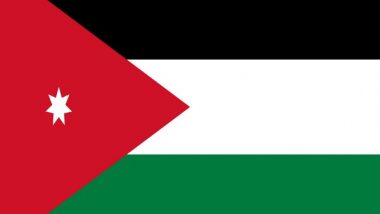By John Solomou
Nicosia [Cyprus], November 29 (ANI): Thousands of Jordanians took part in a huge protest at the heart of the Jordanian capital Amman on Thursday against the declaration of intent signed last Monday in Dubai for water for energy deal by Jordan, Israel, and the United Arab Emirates.
Also Read | China Reports 21 New COVID-19 Cases Amid 'Omicron' Threat.
The protesters shouted slogans that normalization of relations with Israel was treason and demanded that the government immediately scrap the deal and sever ties with Israel. Soon after the deal was announced hundreds of students organized protests in various university campuses all over the country.
It should be noted that there is a very strong anti-Israel sentiment in Jordan, as almost 10 million of its citizens are Palestinians who were expelled or fled to the Hashemite Kingdom of Jordan in the fighting that accompanied the creation of Israel in 1948.
Also Read | Taliban Claims to Build Independent Afghanistan’s Air Force Despite Financial Crisis.
The Muslim Brotherhood in Jordan condemned the deal and said: "We reject this normalization with the Zionist entity which practices the worst form of terror and crimes against our families and brothers in occupied Palestine. The movement condemns and rejects putting vital and strategic sectors in the hands of a hostile entity that does not respect deals and agreements."
The deal, if finally implemented, will be one of the largest regional cooperation projects between an Arab country and Israel and provides for the building by the UAE of a plant having600 megawatt solar generating capacity to be exported to Israel for 200 million cubic meters of desalinated water annually.
Jordan is the second driest country in the world with annual water resources less than 80 cubic meters per person, far below the international threshold of 500 meters per person. For many years the country has been facing acute water shortages and the situation is becoming desperate.
This year, six of Jordan's 14 dam reservoirs dried up, as rainfall dropped 60% of its annual average. The water situation is aggravated by the influx of refugees from Syria who reduce further the average of cubic meters of water per person.
Ministers from the three countries signed last Monday a US-brokered memorandum of understanding (MoU) at a Dubai Expo Fair event which was attended by John Kerry, the US Special Presidential Envoy for Climate, who played a major role in facilitating the deal. The MoU means that feasibility studies for the mega project will begin early next year, explained the Jordanian Water Ministry.
The MoU envisages that the United Arab Emirates- which last year normalized relations with Israel - will build in Jordan a giant photovoltaic plant with a capacity to generate 600 MW of green power that will be exported to Israel, and in its turn, Israel will supply Jordan with up to 200 million cubic meters of desalinated water.
Israel has drastically increased its capacity for water desalination and Jordan has vast desert areas suitable for solar energy farms.
Jordan's Minister of Water and Irrigation Mohammad Al-Najjar said that climate change and the influx of refugees have further exacerbated Jordan's water challenges but added that "there are many opportunities for regional cooperation to help increase sustainability in the sector."
Israeli Energy Minister Karine Elharrar described the Israel-Jordan agreement as to the "most significant" since the former enemies signed a peace treaty in 1994 and said: "The benefit of this agreement is not only in the form of green electricity or desalinated water, but also the strengthening of relations with the neighbour that has the longest border with Israel."
In a statement, John Kerry stressed that the Middle East is on the frontline of the climate crisis and added "Only by working together can countries in the region rise to the scale of the challenge."
In July the new Israeli Prime Minister Naftali Bennet tried to improve relations with Jordan, which had cooled under his predecessor Benjamin Netanyahu, and it was announced that Israel would sell 50 million cubic metres of water a year to Jordan, doubling what it already supplies. In October Israel agreed to raise the amount further.
Surprisingly, according to press reports, the Saudi government expressed opposition to the MoU signed in Dubai. The Axios news site reported that the Saudi government pressured the United Arab Emirates to back off from this deal.
"Senior Saudis were upset because they felt the deal undermined Crown Prince Mohammed bin Salman's plans to lead the region on climate through his "Green Middle East" vision. They called their Emirati counterparts to protest and push them to back off the deal. They even proposed an alternative Saudi-UAE-Jordan deal that would sideline Israel," the Axios report said.
There is no doubt that the Jordan-Israel solar power for water deal if it comes to fruition, will help the Hashemite Kingdom to face the nightmarish problem of not having adequate quantities of water for the needs of its population. But it can also have wider regional repercussions, as Arab governments may start to see the Abraham Accords- the cooperation agreements between Israel and several of its Arab neighbours- under a new positive light.
As Ghaith al-Omari and Simon Henderson of the Washington Institute for Near East Policy point out: "Beyond the practical, however, the deal can facilitate important diplomatic goals and serve as a model for integrating the first generation of Arab peacemakers- Jordan and Egypt-with countries that have joined the Abraham Accords...Depending on its final details, the new trilateral agreement may highlight how Arab parties to the Abraham Accords can facilitate numerous areas of cooperation in Israeli-Jordanian (and Israeli-Egyptian) relations. Amman, Cairo and Jerusalem seem ready for progress, and the Abraham Accords countries are poised to assist in this regard." (ANI)
(This is an unedited and auto-generated story from Syndicated News feed, LatestLY Staff may not have modified or edited the content body)













 Quickly
Quickly

















